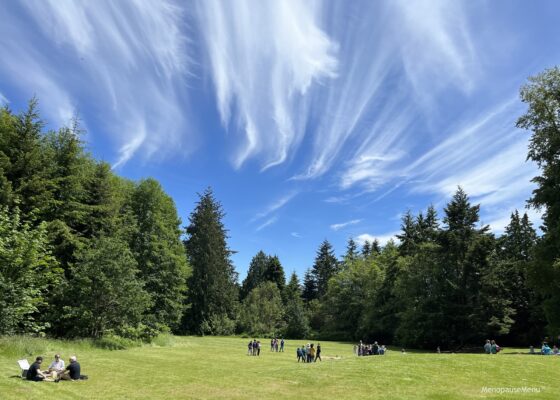What do you see in the following picture?

Do you see the outdoor classroom kids playing musical chairs baseball tag? Do you see the beautiful wispy horsetail clouds? Do you see the mowed green grass field and the thick dark green trees?
Perhaps your eye wanders to the lower left trio enjoying a picnic on the ground. Do you see the senior?
This picture was an easy one––easy to see the beauty and fun. But, much of what we are exposed to on a daily basis is not like this scene.
I was struck today by reading this study in the American Medical Association’s publication JAMA entitled “Experiences of Everyday Ageism and the Health of Older US Adults.”
In this cross-sectional study of 2035 US adults ages 50 to 80 years, everyday ageism was prevalent (93.4%), experienced at differing levels by population sociodemographic characteristic, and associated with multiple indicators of poor physical and mental health.
Julie Ober Allen, PhD, MPH; Erica Solway, PhD, MSW, MPH; Matthias Kirch, MS; et al from their JAMA article linked above
This is nothing new per se and has been an important topic in workplace settings for quite some time. But, it is imperative that we consider the consequences related to health and illness.
This definitely applies to everyone, not just postmenopausal women. That being said, just at a time in women’s lives when we are adjusting to a new body rhythm, the very process of aging is also playing a major role.
Ageism is a common, socially condoned type of discrimination in the US. Ageism refers to stereotypes, prejudice, and discrimination related to old age, aging processes, and older adults. Major life events rooted in age-based discrimination have been associated with poor health outcomes.
(same source as first quote)
I would challenge all women to consider redefining what it means to age. Mental health changes, chronic illness, injuries and situational challenges––they are all valid and important to embrace.
Embracing does not mean giving up. It implies a frame-shift of sorts, a new definition, even a “new normal” perhaps. I prefer to think that those of us in the 50-80 age group possess a wisdom of our bodies that is unparalleled.
My maternal grandmother was born in 1905 and died the day after her 105th birthday. Her journey certainly redefined my own perception of aging, as it should.
Let’s all form a new mental picture of what aging means to our bodies and minds, and share this new picture widely. As the old adage reminds us, a picture is worth a thousand words!